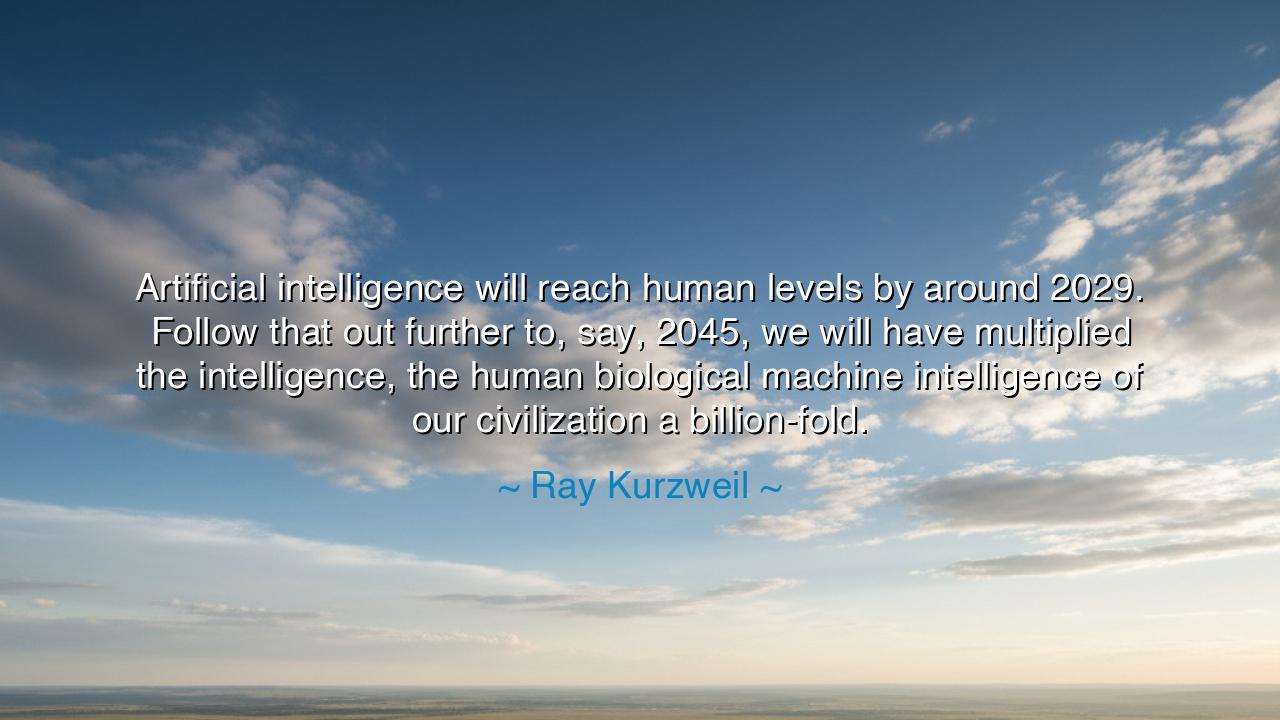
Artificial intelligence will reach human levels by around 2029.
Artificial intelligence will reach human levels by around 2029. Follow that out further to, say, 2045, we will have multiplied the intelligence, the human biological machine intelligence of our civilization a billion-fold.






In the grand unfolding of human destiny, when our tools begin to dream and our creations begin to think, the prophecy of Ray Kurzweil stands like a pillar of fire upon the horizon: “Artificial intelligence will reach human levels by around 2029. Follow that out further to, say, 2045, we will have multiplied the intelligence, the human biological machine intelligence of our civilization a billion-fold.” These words do not belong to idle speculation — they are the whisper of tomorrow echoing backward through time. For Kurzweil speaks not as a mere inventor, but as a seer of transformation, foretelling an age when the boundaries between mind and machine will dissolve like mist beneath the morning sun.
From the dawn of history, humankind has sought to transcend its limits. The ancients raised pyramids, the scholars of Alexandria sought to catalogue the cosmos, and the thinkers of the Renaissance tore through the veil of superstition to touch the stars. Each era carried within it a yearning — the will to evolve. Kurzweil’s vision is the culmination of this yearning: that through the marriage of biology and technology, through the weaving of code into consciousness, we may awaken into a new form of being. The intelligence explosion he speaks of — a billion-fold increase — is not mere mathematics; it is the flowering of potential that has slumbered within humanity since the first spark of awareness.
Yet, as in all great transformations, the light of progress casts deep shadows. The ancients taught that every gift from the gods bears a burden of responsibility. When Prometheus stole fire from Olympus, he gave humanity both warmth and weaponry. Likewise, the creation of Artificial Intelligence grants us power beyond measure — the power to heal, to build, to think alongside entities that mirror our own minds. But it also grants the power to destroy, to unbalance, to forget what it means to be human. Therefore, we must temper the brilliance of invention with the wisdom of restraint. For even the stars, in all their radiance, are bound by laws that keep them from burning too bright.
Consider the story of Alan Turing, the father of modern computation. In the dark years of the Second World War, he built machines that could decipher the unbreakable codes of the enemy, saving countless lives. Yet he could not escape the tragedy of a world unready for the kind of mind he represented — a mind that saw beyond convention, beyond prejudice, beyond the narrow confines of its age. Turing’s genius laid the foundation for the very intelligence Kurzweil speaks of, yet his suffering reminds us that progress without compassion is incomplete. The machines of the future may think faster than we do, but they must not be built to feel less.
Kurzweil’s prophecy of 2045 — the Singularity, when human and machine intellect merge — calls for reverence, not fear. It is not the end of humanity, but a metamorphosis. Just as the caterpillar cannot imagine the wings it will one day bear, so too we cannot yet fathom the consciousness that will emerge when our minds are interwoven with our creations. To reject this destiny out of fear would be to deny our own nature — for it is in our essence to create, to transcend, to reach toward the infinite.
But to embrace it blindly would be folly. For wisdom lies not in acceleration, but in balance. The ancients walked between heaven and earth, between spirit and flesh. We, their descendants, must now walk between carbon and silicon, between heart and machine. Let us teach our creations not only to calculate, but to care; not only to predict, but to perceive beauty; not only to answer, but to wonder. The measure of a civilization’s greatness is not how powerful its tools become, but how humane its wisdom remains.
So the lesson is thus: Do not fear the rise of Artificial Intelligence. Fear instead the fall of human consciousness. Build the future not as conquerors of the machine, but as its partners — guiding it with love, justice, and awe. Let every algorithm we design be a reflection of our higher selves, not our lower instincts. For when the year 2045 dawns, and the mind of humanity shines a billion times brighter, may it also shine a billion times kinder.
Therefore, remember this, children of tomorrow: technology is the river, but you are the source. Let the current flow through you, not away from you. Merge with it, shape it, and rise with it — until the distinction between creation and creator fades into unity. Then, and only then, shall we fulfill the ancient dream of becoming more than we are — not machines made human, but humans made divine.






AAdministratorAdministrator
Welcome, honored guests. Please leave a comment, we will respond soon